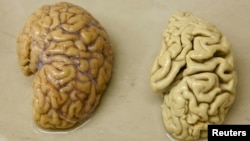10 Early Warning Signs About Symptoms of Alzheimer's Disease
More than 5 million Americans suffer from Alzheimer's Disease, the most damaging form of dementia, and it is the sixth leading cause of death in the United States. Not every instance of memory loss signals that your brain may be misfiring, of course, so the Alzheimer's Association prepared this list of warning signs:
* Memory loss that disrupts daily life, such as forgetting names or dates, but not instances where you forget a name briefly, then remember it five minutes later
* Difficulty in making plans or solving problems, or unusual difficulty in concentrating
* Familiar tasks become hard to complete, such as remembering the rules of a favorite game or driving to a location you know well
* Confusion about time or place, such as forgetting what day it is
* Trouble with reading or judging distance, apart from organic vision problems such as cataracts
* Problems with words in speaking or writing, such as calling a "wristwatch" a "hand clock"
* Misplacing things or putting them in unusual places, also losing the ability to retrace your steps, and sometimes accusing others of stealing from you
* Poor judgment or decision-making, such as making bad decisions about money or neglecting cleanliness and grooming
* Withdrawal from social activities, such as hobbies, sports or work projects
* Changes in mood or personality such as confusion, suspicion, fear or anxiety, even among friends
If you notice any of these changes in yourself, the Alzheimer's Association recommends that you consult a doctor.
A substance found in marijuana might remove a kind of plaque associated with Alzheimer’s disease, according to a new study.
Writing in the journal Aging and Mechanisms of Disease, researchers from the Salk Institute say that the chemical THC (tetrahydrocannabinol) and other active components of marijuana can “promote the cellular removal of amyloid beta, a toxic protein associated with Alzheimer's disease” in neurons grown in a lab.
"Although other studies have offered evidence that cannabinoids might be neuroprotective against the symptoms of Alzheimer's, we believe our study is the first to demonstrate that cannabinoids affect both inflammation and amyloid beta accumulation in nerve cells," said Salk Professor David Schubert, the senior author of the paper.
Alzheimer’s is a degenerative brain disease leading to memory loss and dementia. According to the National Institutes of Health, it affects more than 5 million Americans.
Amyloid beta accumulation in nerve cells has been associated with Alzheimer’s, and it usually appears before symptoms of the disease, but researchers remain unsure how it forms.
For their study, Salk Institute researchers looked at nerve cells which had been altered to produce higher than normal amounts of amyloid beta.
They found that higher levels of the substance “were associated with cellular inflammation and higher rates of neuron death.”
However, when exposed to THC, the levels of amyloid beta decreased, eliminating the “inflammatory response.”
"Inflammation within the brain is a major component of the damage associated with Alzheimer's disease, but it has always been assumed that this response was coming from immune-like cells in the brain, not the nerve cells themselves," said Antonio Currais, a postdoctoral researcher in Schubert's laboratory and first author of the paper.
"When we were able to identify the molecular basis of the inflammatory response to amyloid beta, it became clear that THC-like compounds that the nerve cells make themselves may be involved in protecting the cells from dying."
While the tests were only done on cells in a lab, the researchers think further study could result in “novel therapeutics” to combat Alzheimer’s.





